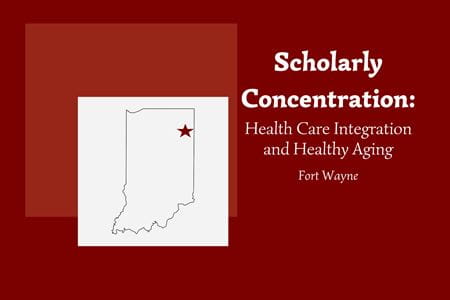At Indiana University School of Medicine, the Health Care Integration and Healthy Aging scholarly concentration helps medical students understand how to deliver coordinated, patient-centered care to older adults. This concentration emphasizes collaboration among healthcare providers, specialists and community resources to address the physical, emotional and social needs of aging populations — while navigating increasingly complex healthcare systems.
Fast facts about the concentration
- Location: Fort Wayne campus
- Co-directors: Leslie Hoffman, PhD, and Robert Sweazey, PhD
Meet the co-directors
The Health Care Integration and Healthy Aging scholarly concentration is co-directed by Leslie Hoffman, PhD, and Robert Sweazey, PhD.
Sweazey is an associate professor of anatomy, cell biology and physiology and the acting associate dean and director of the IU School of Medicine—Fort Wayne campus. He has conducted research into aging and oversees a brain bank for research on Alzheimer's disease and related disorders.
He said the Health Care Integration and Healthy Aging scholarly concentration is important because the aging population is the fastest-growing population in the country and has the greatest number of health needs, from polypharmacy to multiple health conditions, which must be addressed.
“The integration of care across the system is not great, and if we're going to maximize care for the elderly population, we need to better integrate different health professionals,” Sweazey said. “And I think that's what our concentration focuses on — how to integrate that care. We just use the elderly population because it’s such a good example of people who need an integrated healthcare system.”
Hoffman is also an associate professor of clinical anatomy, cell biology and physiology at IU School of Medicine—Fort Wayne. Reflecting on the past few years that she and Sweazy have led this concentration, Hoffman said the most exciting parts have been seeing students get involved in research and bringing in more research mentors.
“We now have students who are doing research in public health, Alzheimer's disease, stroke and cardiovascular disease,” Hoffman said. “It's just really exciting that our students are branching out and doing research that's related to a lot of different aspects of aging.”
Sweazey said the concentration has also added successful collaborations with the IU School of Medicine’s geriatrics program in Indianapolis and the IU Richard M. Fairbanks School of Public Health, which have helped them develop additional course material.
What students can expect
Students in the Health Care Integration and Healthy Aging scholarly concentration will explore how to improve care coordination across specialties and systems. While aging is a central theme, the concentration is not limited to geriatrics; it’s relevant to any student interested in understanding how healthcare systems work and how to collaborate effectively within them.
“It's important to understand how to work within a healthcare system and how to integrate care among different providers and among different specialties, as well as just being aware of community resources and different public health resources that are available to help care for your patient, regardless of demographics,” Hoffman said.
The program is designed to be flexible, allowing students to tailor their scholarly work to their interests, with support from experienced mentors.
“You can customize how you pursue this scholarly concentration,” Sweazey said. “If you have a particular interest, we can usually find a research mentor to help you so that you can pursue something that interests you.”
The Fort Wayne campus offers a supportive, close-knit environment with a class size of just 32 students. Faculty and students build strong relationships, and students benefit from personalized mentorship and academic support.
“Our students get to know each other in these small classes, and they do things together [socially], so it's a real collegial type of environment for students who are not just doing the scholarly concentration but attending the campus academically,” Sweazey said. “There are also a lot of support systems in place to help the students succeed. Because we are a smaller campus, students get to know the faculty, and faculty get to know their students and are always there to help them if they're struggling.”
Students also have access to a wide range of mentors working on topics related to healthcare integration and aging, making Fort Wayne a strong home base for this concentration.
Is this the right fit?
While this concentration is ideal for students interested in geriatrics, it’s also applicable to any specialty. Hoffman emphasized that understanding how to work within a healthcare system and integrate care among providers is essential for all future physicians.
“If students have an interest in geriatrics, this is a very natural fit,” Hoffman said. “But even if students are interested in family medicine or internal medicine, they're going to be working with an aging population, regardless of what specialty they choose. I think this scholarly concentration is going to be applicable for a lot of different students and a lot of different interests.”
Students will also gain valuable research skills and experience — research techniques, study design, and how to publish their findings — essential for lifelong learning and career progression.
